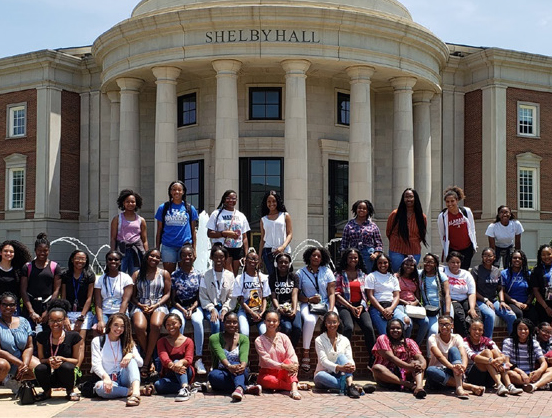
The LEGACY students took a break during their weeklong computer science workshop this summer to take a photo outside of Shelby Hall.
A National Science Foundation grant will enable The University of Alabama to introduce young women of color to opportunities in computer science.
The LEGACY Program is an initiative to prepare African American high school females in Alabama for the College Board’s Advanced Placement Computer Science Principles course and exam. In collaboration with Tuskegee and Oakland universities, the grant will fund a new cohort of 40 students each year for three years.
The participating scholars will have a year-long computer science preparatory experience that begins with summer training and mentoring and continues through the academic year. Each participant will take the AP course during the 2019-2020 school year and the exam in May 2020.
“LEGACY brings African American girls from all over the state here, to UA, and to work with us all year round to get them ready for the AP CSP course and exam,” said Dr. Jeff Gray, UA computer science professor.
This year’s cohort will be on UA’s campus June 2-7 for a weeklong workshop. Each day, the students will get a summarized version of the AP CSP course they will take during the upcoming school year. Three African American female teachers from across the state — Pam McClendon, Wendy Johnson, Donnita Tucker — will lead the workshop.
In the afternoon, the students will attend panels where they will hear from noted female software engineers from Microsoft and Google. The professionals will give the students advice and talk about their experiences in the field.
Four current UA female African American computer science students — Phoebe Burns, Jovonda Robinson, Kristade Swain, Brianna Wimer — will be mentors to the participants during their week on campus and offer insight into life as a college student. The high school scholars will also get to experience social activities during the evenings including watching the movie Hidden Figures.

The goal of the program is to increase participation and preparation of African American girls who, Gray said, have the lowest percentage of representation in computer science and software development fields. While Alabama is doing better than most in this area, he said there is room to improve.
“We’re already third in the country in the number of African American girls per capita taking this test, and we’re hoping this project will help Alabama become No. 1,” Gray said.
In addition to giving students a head start in content knowledge, he said it will also give them confidence to succeed in the computer science discipline and insight into college life.
The group will meet again for a two-day workshop at Tuskegee in July. The program will continue throughout the school year as a support system to the students. Scholars who complete the LEGACY program will get a stipend to cover travel, lodging, technology and the AP exam to ensure total participation.
More than 100 students applied to the program this year. Gray hopes LEGACY will make an impact at each of the participants’ schools and their peers will be uplifted by their success.
“We want to have a very diverse student population ourselves [at UA], and we can’t achieve that if we’re not doing something to help build that pipeline,” Gray said. “This grant helps to get that pipeline going by encouraging and inspiring African American women.”
The participants in the first LEGACY cohort are from the following schools across Alabama:
Alabama School of Fine Arts, Austin High School, Beulah High School, Buckhorn High School, Central High School, Cullman High School, Francis Marion High School, Hewitt-Trussville High School, Hillcrest High School, Hoover High School, Jackson High School, Loveless Academic Magnet Program, McIntosh High School, Minor High School, Monroe County High School, Muscle Shoals High School, New Century Technology, Park Crossing High School, Paul W. Bryant High School, Russell County High School, Sheffield High School, Sparkman High School, Sumter Central High School, W.P. Davidson High School